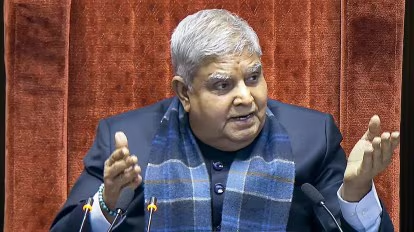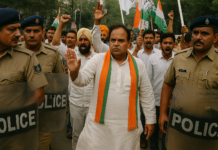
In a recent statement, Vice President of India Jagdeep Dhankhar sparked a major national debate by declaring that the Preamble of the Indian Constitution is “not changeable”. His comment immediately triggered a wave of discussions and criticism across political, academic, and public platforms because the Preamble had actually been amended once before — in 1976, during the Emergency imposed by the then Prime Minister Indira Gandhi. The Vice President’s statement has revived attention on an important constitutional question: Can the Preamble of India really be changed or not?
Dhankhar’s Statement and Its Significance
Speaking at a public event, Vice President Dhankhar said that the Preamble cannot be touched, and suggested that it is beyond the scope of any alteration. He described the Preamble as the soul of the Constitution, a sacred document that contains the core values on which the Indian democracy is founded — namely Justice, Liberty, Equality, and Fraternity. According to him, these principles are timeless and must remain untouched for the sake of constitutional integrity and national unity. His words were meant to reinforce the sanctity of the Constitution, but they ended up opening a complex conversation because of the historical facts that contradict his claim.
The 1976 Emergency and the 42nd Amendment
The contradiction arises from a significant historical event that took place during the Emergency period from 1975 to 1977, under the leadership of then Prime Minister Indira Gandhi. In 1976, the government passed the 42nd Amendment to the Constitution, which is widely referred to as the “Mini-Constitution” due to its sweeping and extensive changes. One of the most debated changes introduced by this amendment was the alteration of the Preamble itself.
Before the amendment, the Preamble described India as a “Sovereign, Democratic, Republic.” However, the 42nd Amendment inserted two additional terms: “Socialist” and “Secular.” As a result, the Preamble now read: “Sovereign, Socialist, Secular, Democratic Republic.” These changes marked a clear ideological shift and became a symbol of the government’s broader attempt to centralize power and redefine the nation’s identity.
Meaning and Impact of the New Terms
The word “Socialist” was added to signal the state’s intent to promote economic equality, government ownership of key industries, and equitable distribution of wealth. This term reflected the Congress party’s commitment to a mixed economy and was deeply influenced by socialist ideals popular at the time. On the other hand, “Secular” was included to emphasize the state’s neutrality toward all religions and its commitment to ensuring religious freedom and equal treatment for all citizens, regardless of their faith.
These changes were not just symbolic. They influenced legal interpretations, public policy, and the political narrative in India for decades. Therefore, saying the Preamble is not amendable ignores a critical chapter in India’s constitutional history.
What Does the Constitution Actually Say?
The Indian Constitution, under Article 368, provides Parliament with the power to amend the Constitution. However, it does not explicitly mention whether the Preamble can be amended or not. This question was settled to some extent in the landmark Kesavananda Bharati v. State of Kerala case in 1973, where the Supreme Court ruled that the Preamble is indeed a part of the Constitution. More importantly, the Court stated that the Constitution can be amended, including the Preamble, but the “basic structure” of the Constitution must not be altered.
This basic structure doctrine has since become a cornerstone of Indian constitutional law. It means that while Parliament can make changes to the Constitution, it cannot alter its essential features, such as democracy, secularism, federalism, and judicial independence. Therefore, amending the Preamble is legally possible, as long as it does not violate the basic structure.
Legal and Political Reactions to Dhankhar’s Remark
Following Jagdeep Dhankhar’s comments, several political leaders, legal scholars, and journalists challenged the accuracy of his statement. Many pointed out that the fact that the Preamble was amended in 1976 is not just a matter of political memory, but a documented constitutional amendment that is still in force. Legal experts also highlighted that the Supreme Court has never declared the 42nd Amendment to the Preamble unconstitutional, meaning it remains valid.
While some people defended Dhankhar’s statement as a moral or philosophical stance — saying that we should not amend the Preamble again in the future — others criticized it as misleading and incorrect. Critics argued that when such remarks come from the Vice President of the country, who is also the Chairman of the Rajya Sabha, they carry great weight and should be based on constitutional facts.
Importance of the Preamble in Today’s India
The Preamble is often described as the mirror of the Constitution, the summary of its guiding vision. It reflects the hopes, dreams, and commitments of the people of India. Terms like Justice, Liberty, Equality, and Fraternity are more than just words — they are aspirations for a just society.
In a time when India faces challenges like communal tension, economic disparity, freedom of speech concerns, and identity politics, the ideals enshrined in the Preamble become even more relevant. It acts as a moral compass for lawmakers, judges, and citizens alike. The debate around whether it can be changed should not take away from the need to practice its principles in everyday governance and policy-making.
Why This Debate Matters for the Nation
This debate comes at a time when the country is celebrating 75+ years of independence, and heading into critical political moments like the 2024 general elections. Constitutional awareness, especially among the younger generation, is more important than ever. When top leaders discuss the Constitution in public, it shapes the public understanding of democracy and law.
Moreover, constitutional literacy remains low in many parts of India. Many citizens are not aware that the Constitution is a living document that can evolve with time, but only through a structured and democratic process. The Preamble is not untouchable, but it must be handled with great care and respect. The Supreme Court has made it clear: change is allowed, but the soul cannot be destroyed.
What Every Indian Should Know
For the average citizen, it is important to understand that the Preamble is a legally recognized part of the Constitution. It was amended in 1976 through the 42nd Amendment Act, and the terms “Socialist” and “Secular” were added. These changes were made through proper constitutional process, debated in Parliament, and have been in effect for almost five decades.
The Supreme Court has confirmed the legal validity of these changes, and also laid down that any future amendments must respect the basic structure. So while the Preamble is not rigidly fixed, it is also not open to casual or political tampering. It is a national commitment that must evolve carefully, and only when truly needed.
The Constitution of India is not just a set of laws. It is the framework that defines who we are as a people. The Preamble, in particular, gives a direction to this framework, reminding every Indian of our shared values and goals. Jagdeep Dhankhar’s statement, whether viewed as a warning or a mistake, has opened up a much-needed discussion on the meaning, history, and future of the Constitution.
Instead of being divided by this debate, the country should use this moment to re-engage with the Constitution, learn its history, understand its power, and protect its essence. After all, it belongs to the people, and its strength comes not just from what is written in it, but from how we uphold its spirit every day.


































